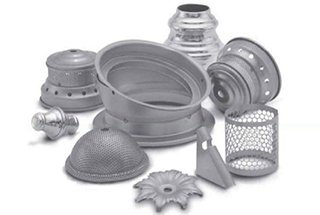It is one of the indexes of metal strength.
Characteristics of sheet metal forming.
Similar to shape rolling but.
When making sheet metal however companies often use one or more of the following forming processes.
Metal forming tends to have more uniform characteristics across its subprocesses than its contemporary processes cutting and joining.
Sheet metal roll forming roll forming of sheet metal is a continuous manufacturing process that uses rolls to bend a sheet metal cross section of a certain geometry.
Tools include punch die that are used to deform the sheets.
Curling is a sheet metal forming process that s used to smooth out the otherwise sharp and rugged edges of sheet metal.
Suitabl e for low quan tity production.
Pr ocess characteristics roll forming long parts with constant complex cross sections.
N mm2 or mpa the symbol is σb.
Because this book is limited to bend forming which is the simplest of sheet metal forming operations the basic discussion is limited to bending.
Countless everyday objects are fabricated from sheet metal.
Often several rolls may be employed in series to continuously bend stock.
Sheet metal forming process is done on a press and the parts are formed in between two die.
The press is usually not yet known so that its characteristics are rather a factor of noise than a useful information.
It is the maximum stress that the cross section is subjected to when the load is applied between the two points of the specimen.
Sheet metal is metal formed by an industrial process into thin flat pieces.
On the industrial scale forming is characterized by.
It is customary to refer to a material below the thickness of 6 35 mm as a sheet and thicker materials as plate.
The die at the top is called a punch.
Therefore it will be important to have a design that.
Sheet metal forming is quite common for making shaped components from soda cans to automotive car bodies.
Very high loads and stresses required between 50 and 2500 n mm2 7 360 ksi.
Sheet metal is one of the fundamental forms used in metalworking and it can be cut and bent into a variety of shapes.
Stretch form ing large parts with shallow contours.
It is the maximum stress that the sheet metal material is subjected to before pulling out.
Sheet metal forming processes table 7 1 general characteristics of sheet metal forming processes.
Classification of basic sheet forming processes.
Sheet metal forming involves forming and cutting operations performed on metal sheets strips and coils.
The surface area to volume ratio of the starting metal is relatively high.
Sheet metal often contains sharp edges with burrs after it s initially produced.

